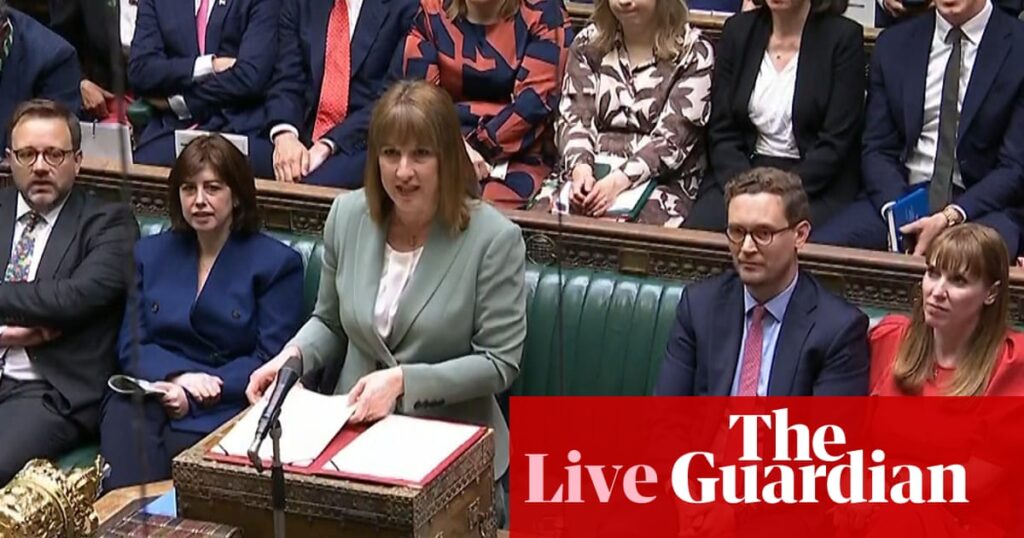Reeves says the Tories lost control of the border.
She says last year she set aside £150m for Border Security Command. This will increase by up to £280m a year, she says.
And she says the government is tackling the asylum backlog.
The government will end the use of hotel for asylum seekers “in this parliament”.
She says this will save the taxpayer £1bn a year.
Although the Department for Energy Security and Net Zero has got the biggest funding increase in percentage terms (see 1.35pm), health has got the biggest increase – by far – in cash terms. That is because it is a far bigger spending department. This chart from the spending review document illustrates this.
Interestingly, the Treasury has decided in this chart to separate police spending (up 2.3%) from other Home Office spending (down 4.5%).
Alert readers may notice that the spending review document says health spending is going up 2.8%, while Rachel Reeves used the figure 3% in her speech to MPs. (See 1.17pm.)
That is because Reeves was talking specifically about NHS spending. The Department of Health and Social Care spends most of its money on the NHS, but it also funds some other health-related spending, and these bits of the budget are not getting 3%, which brings down the overall figure.
Here is the table from the main spending review document (on pages 44 and 45) showing the spending figures for the spending review period, department by department.
It shows that, if you look at growth between 2023-24 and 2028-29 as the metric for success, Ed Miliband, the energy secretary, is the real winner. His department’s spending is going up 16%.
The Treasury has revealed the 25 “trailblazer neighbourhoods” who will receive long-term investment through a new fund announced in the spending review.
They will receive up to £20m each. The Treasury says:
This investment will support communities to drive forward the changes they want to see in their neighbourhoods. It will support improvements people can see on their doorstep, champion local leadership, foster community engagement and strengthen social cohesion.
Here’s the list:
-
Orchard Park, Kingston upon Hull,
-
Little Layton and Little Carleton, Blackpool
-
Brinnington, Stockport
-
Bentilee and Ubberley, Stoke-on-Trent
-
Speke East, Liverpool
-
Thorntree, Middlesbrough
-
Batemoor and Jordanthorpe, Sheffield
-
Hartcliffe, Bristol,
-
Benchill South and Wythenshawe Central, Manchester
-
Warndon West, Worcester
-
Birkenhead Central, Wirral
-
Middleton Park Avenue, Leeds
-
Penhill, Swindon
-
Parkwood and Senacre, Maidstone
-
Walker North, Newcastle upon Tyne
-
Bootle South, Sefton
-
Pendleton, Salford
-
Birchwood West, Lincoln
-
Central Stockton and Portrack, Stockton-on-Tees
-
Barrow Central, Westmorland and Furness
In addition, the five trailblazers in Scotland, Wales and Northern Ireland will be a neighbourhood in each of the following:
-
Glasgow
-
Fife
-
Swansea
-
Cardiff
-
Belfast
The Treasury has now published all its spending review documents.
They are here.
Mel Stride, the shadow chancellor, is responding on behalf of the Tories.
He starts by saying the spending review is not worth the paper it is written on.
It is a “spend now, tax later” review, he says.
He says Reeves has “completely lost control”.
He says people face a cruel summer waiting to see where taxes will go up.
UPDATE: Stride said:
This spending review is not worth the paper that it is written on, because the chancellor has completely lost control.
This is the spend now, tax later review, because [Reeves] knows she will need to come back here in the autumn with yet more taxes and a cruel summer of speculation awaits. How can we possibly take this chancellor seriously after the chaos of the last 12 months …
These spending plans are a fantasy, and is it not the truth that the chancellor has to maintain this fiction because she has left herself no room for manoeuvre?
She is constantly teetering on the edge of blowing her fiscal rules, which she already changed to allow even more borrowing.
And the only way she can claim to be meeting her rules is by pretending that she can control spending over the coming years.
Rachel Reeves’s announcement has all been about explaining how money will be spent, rather than how it will be raised (it’s not a budget).
But looking ahead, the National Institute of Economic and Social Research suspects the chancellor may be forced to raise taxes at the next fiscal event, in the autumn, to keep within her borrowing rules.
Stephen Millard, NIESR interim director, explains:
“The Chancellor has yet again said that her fiscal rules are ‘non negotiable’. But, given the small amount of headroom at the time of the Spring Statement and the increases in spending announced since then, it is now almost inevitable that if she is to keep to her fiscal rules, she will have to raise taxes in the Autumn Budget.”
Reeves is now wrapping up.
I have made my choices. In place of chaos, I choose stability. In place of decline, I choose investments. In place of pessimism, division and defeatism, I choose national renewal. These are my choices, these are Labour choices, these are the choices of the British people, and I commend this statement to the house.
Reeves says the government will soon publish its 10-year plan for NHS renewal.
To back that plan, she can announce she is making a record cash investment, in the NHS, increasing spending by 3% a year in real terms for every year of the spending review.
That is more than the 2.8% real terms increase that was expected.
Reeves says “finally” she is addressing the NHS.
A strong economy relies on a strong NHS.
But not as the Reform party have called for, an insurance model, she says.
She says Nigel Farage should spend less time in the Westminster Arms. Although, after this week, the Two Chairmen (another Westminster pub – the one favoured by Treasury officials) might be more appropriate, she jokes.
